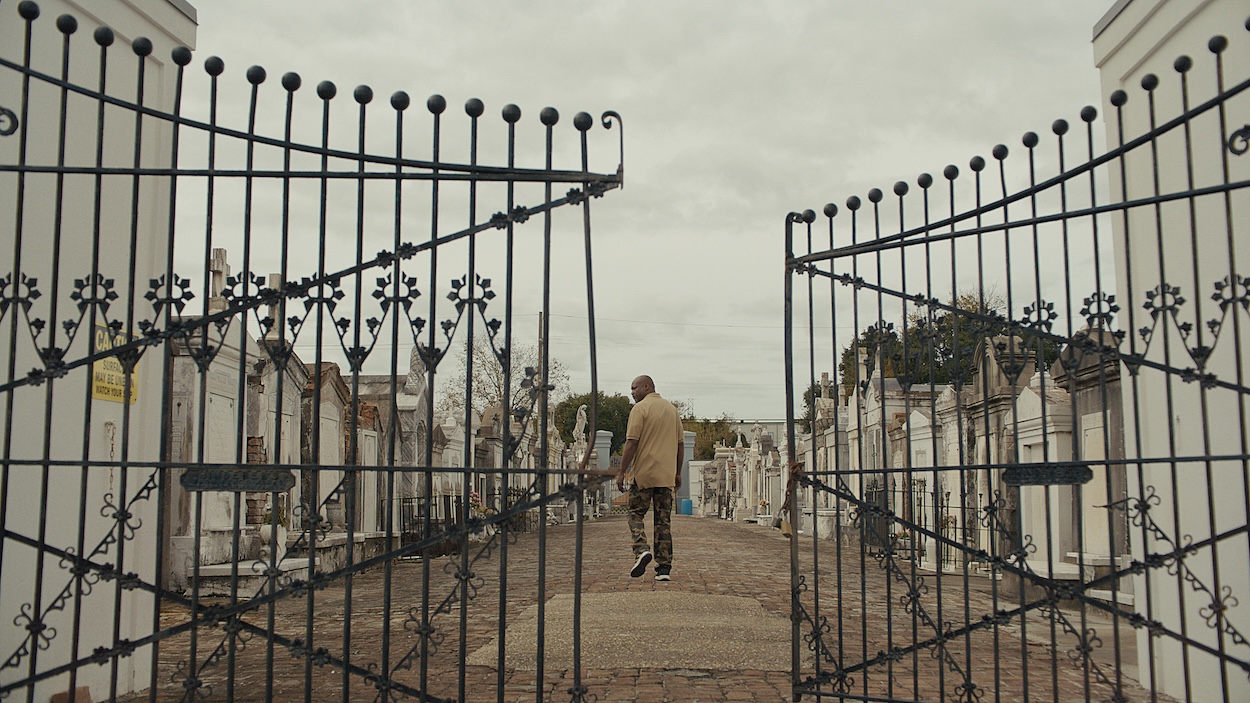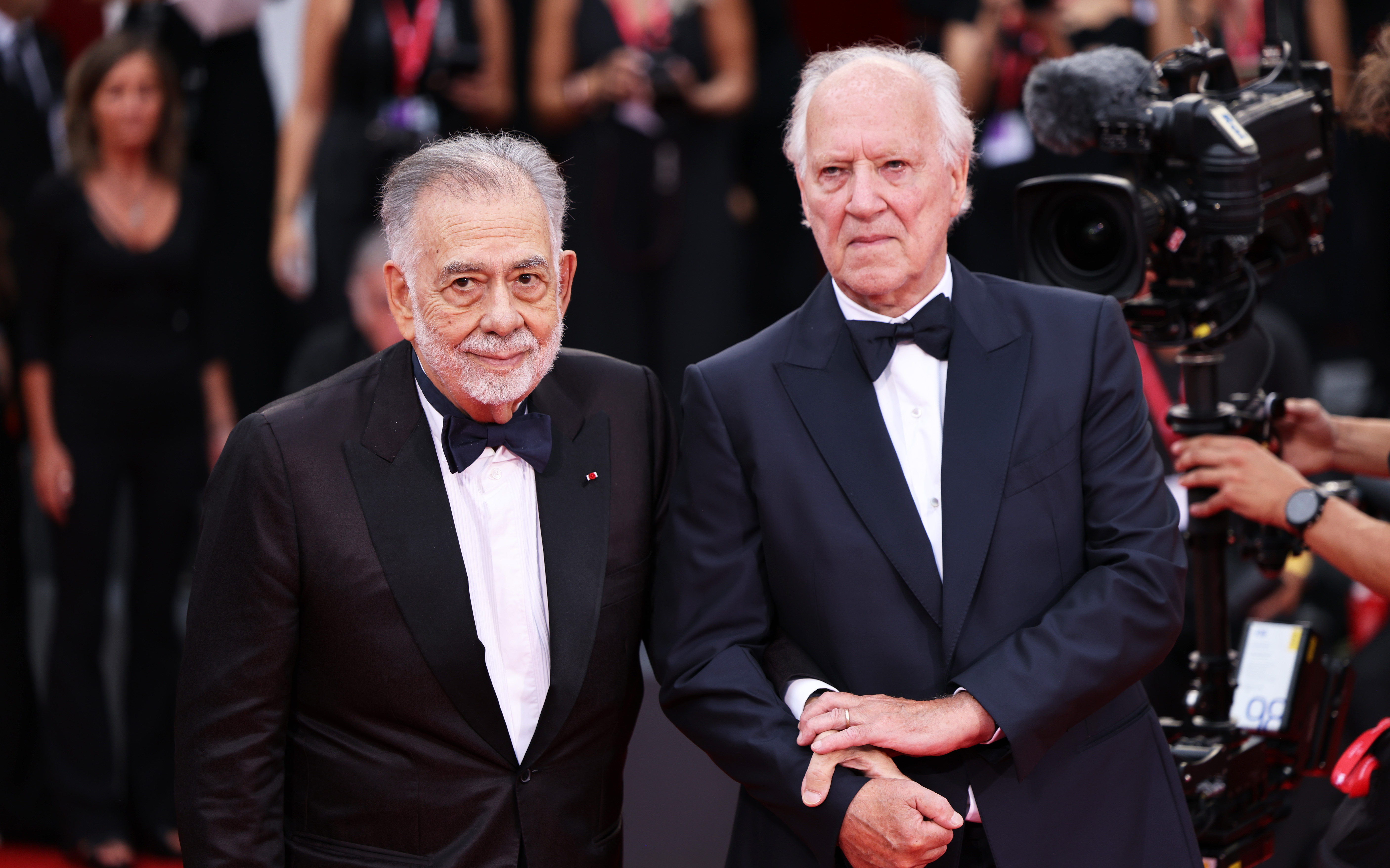There is only one Werner Herzog. The stoic German who, after being shot during an interview, replied in his signature deadpan, “it is not a significant bullet,” has an affinity for those at the end of the world — death row inmates, loners, mystics. Across his extraordinary body of work he has slipped between fiction and documentary with the ease of a man who doesn’t fear death. Now, aged 82, he has been steadily making documentaries exploring a mixture of modern and ancient phenomena — anything that enables him to travel and interview interesting oddballs. “Ghost Elephants” arrives with a little extra fanfare, premiering in Venice alongside the festival awarding him a lifetime achievement award in the form of an Honorary Lion.
On the surface, “Ghost Elephants” appears to be a throwback to one of Herzog’s canonical classics “Grizzly Man” (2005). Ill-fated American bear enthusiast and filmmaker Timothy Treadwell and living South African conservationist and explorer Dr. Steve Boyes are both men more comfortable living within nature than amongst their fellow humans. We meet Boyes misty-eyed at The Smithsonian National History Museum as he stands before the taxidermied corpse of the largest bull elephant to be exhibited in any museum. This, he explains, is “Henry” and Boyes has carried a photo of him around for a decade, only now seeing him for the first time. It is his dream to find the living descendants of Henry who he believes may roam in an elevated Angolan plateau nicknamed “the source of life.”
The hubristic nature of the expedition that follows, and the landscapes captured, call to mind a very different Herzog title. Although Boyes is far mellower than the wild-eyed Klaus Kinski, the pointless desire to make inroads in a land that does not need him evokes something of “Fitzcarraldo” (1982). This judgement is mine, for Herzog is far subtler and more ambivalent in his framing of Boyes, not fully suggesting in this film — made for the National Geographic with Disney money — that his subject is a loon but, equally, not leaving that interpretation off the table.
If Herzog has been compelled by the nature of the assignment to show reserve in the depiction of his leading man, he is more full-throated when it comes to his portrayal of the elephants in question; in the gulf between his enthusiasms, it is possible to see where his strongest sympathies lie. For although the scene at The Smithsonian initially seems set up to introduce us to Dr. Steve Boyes, it also introduces us to Henry, a majestic mammal technically called “The Fénykövi Elephant” after his killer, Josef Fénykövi.
To contextualize Henry, Herzog makes the most of time spent in Namibia, where Boyes has gone to find a crack team of master trackers from the Ju/Hoansi San Bushmen in the Kalahari, one of the oldest cultures on Earth whose language includes clicking. We meet a man named Xui who can “read tracks like a newspaper.” We also meet an aspiring soccer player turned anthropologist who tells the story of how Henry was shot and then chased for 15km in stark, brutal terms.
Herzog inserts a clip from the 1966 film “Africa Addis” of a family of elephants being gunned from a helicopter (anecdotally, a member of the audience was sobbing), as well as photos of a grinning Fénykövi in front of the wrinkled mountain of Henry’s fallen body. The absurdity of men thinking it’s an achievement to destroy beautiful creatures comes across in powerful terms. As the anthropologist puts it, “Man is on a mission to destroy what he’s part of, which is biodiversity.” It’s hard not to remember one of Herzog’s most iconic and indelible lines, “I believe the common denominator of the universe is not harmony, but chaos, hostility, and murder.”
Times have changed and big-game hunting is out of fashion, although coming so soon after harrowing images of elephant poaching, it is alarming when we witness the trackers working a deadly poison into a dart. “Ghost Elephants” is nothing if not a film which commits to asides, and it is compelling when Xui tells a story of his own brush with the poison. Indeed, it is in the patchwork of vignettes that unfold around Boyes, rather than the portrait of the man himself, that the film breathes and Werner Herzog’s auteurial colors flourish.
His whimsical adoration of the mighty beasts at the heart of things is expressed in footage of elephants moving underwater. These sequences — and cut-aways to other rare beasts — offer a magical respite from the underbaked plans of a man whose motive in finding the ghost elephants is never fully articulated. The implication is it’s part of a conservation effort and yet, as Dr. Boyes, Werner Herzog, San Bushman trackers, and trackers from the Luchazi tribe make the 2-day trip from Namibia to the Angolan highlands, the end goal is not given any anticipatory gravity.
Herzog weighs every scene equally, not using one to hype up the next. An audience with the King of Nkangala — whose permission is required to track the ghost elephants — unfolds as casually as footage of a tribesmen spending all day fixing his instrument. There is, in fact, more awe to the latter sequence as expressed in narration: “I know I shouldn’t romanticize him but I know that … surrounded by chickens … it doesn’t get any better than that.”
This is a jazz film held together by Herzog’s distinctive narration with its irreverent sense of humor. It is both frustrating and intriguing to be kept in ignorance regarding his true views on Boyes. His subtle negging at the point of narrative climax is entertaining, yet it does also impact the structure of “Ghost Elephants” itself, denying us an overarching sense of perspective. The pleasure of listening to Herzog speak comes from his bracing candor, so it’s hard not to feel that something is amiss in his implication-driven take on Boyes.
Still, for those willing to piece the picture together from its most glorious sections, this is an affectionate and affection-inducing pursuit of real animals and unreachable dreams.
Grade: B
“Ghost Elephants” premiered at the 2025 Venice Film Festival. It is currently seeking U.S. distribution.
Want to stay up to date on IndieWire’s film reviews and critical thoughts? Subscribe here to our newly launched newsletter, In Review by David Ehrlich, in which our Chief Film Critic and Head Reviews Editor rounds up the best new reviews and streaming picks along with some exclusive musings — all only available to subscribers.



